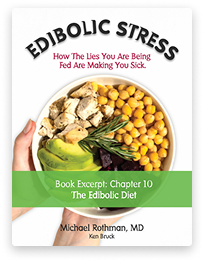Small Intestinal Bacterial Overgrowth (SIBO)
Treating Small Intestinal Bacterial Overgrowth

Ready to Take Control of Your Health?
If you are experiencing symptoms of Small Intestinal Bacterial Overgrowth (SIBO) and are seeking effective, metabolically directed treatments, contact us online or call (732) 268-7663 for a consultation with Dr. Rothman.
What are the Symptoms of SIBO?
SIBO can manifest in a variety of ways and cause symptoms beyond just gastrointestinal, all of which can significantly affect your daily life. Common SIBO symptoms include:
- Bloating: A feeling of fullness or swelling in the abdomen, often after meals.
- Gas: Increased flatulence, often accompanied by discomfort.
- Diarrhea: Frequent loose or watery stools.
- Constipation: Difficulty passing stool, which can also occur alongside diarrhea.
- Abdominal Pain: Cramping or discomfort in the stomach area.
- Weight Loss: Rapid, unintentional weight loss
- Chronic Fatigue: Persistent tiredness that doesn’t improve with rest.
- Nutritional Deficiencies: Individuals might experience deficiencies in vitamins and minerals due to malabsorption, which can contribute to fatigue.
What Causes SIBO?
Anatomical Changes
Structural abnormalities stemming from conditions like diverticulitis or strictures, past surgeries that alter the normal function of the small intestine, or any condition affecting gut motility, such as irritable bowel syndrome (IBS), can contribute to bacterial overgrowth.
Medical Conditions
Certain medical conditions can also lead to SIBO, including diabetes, hypothyroidism, Parkinson’s disease, celiac disease, and hypochlorhydria. Basically, any condition that alters gut flora, motility, or structure can cause SIBO. For example, high blood sugar levels from diabetes can disrupt digestive function, while celiac disease, an autoimmune disorder, can damage the intestinal lining. Hypochlorhydria, characterized by low stomach acid, compromises the gut’s natural defenses. These conditions and others can create environments that promote abnormal bacterial growth in the small intestine.
Medications
Certain medications can also create conditions that allow bacteria to thrive, thus increasing the risk of SIBO. Antibiotics, although used to decrease bacterial counts, can sometimes disrupt the balance of gut bacteria and lead to overgrowth. Similarly, proton pump inhibitors (PPIs), which reduce stomach acid, also create conditions ideal for bacterial growth in the small intestine.
Other Risk Factors for SIBO
Lifestyle factors, like excessive alcohol consumption, can increase the risk of SIBO. SIBO is more common in older adults, likely due to decreased motility. Although the reasons are unclear, SIBO also tends to be more prevalent in women and those with obesity.
If you are experiencing any symptoms of or have cause to suspect SIBO, it is vital to consult a doctor for proper diagnosis, as SIBO can be complex to diagnose and treat. A holistic, metabolically directed treatment approach can help restore gut balance and improve overall well-being.

Our Functional and Metabolic Medicine Approach to SIBO
At Michael Rothman MD, we recognize the impact SIBO and the imbalance of bacteria in the gut can have on your metabolic processes and overall well-being. Our approach to treating SIBO involves a comprehensive, metabolically directed method to identify and address the root causes of your symptoms.
Diagnostic Methods Used:
- Breath testing to detect the presence of excess bacteria. This is a standard test for SIBO diagnosis, in which patients consume a sugar solution and breathe into a collection device. If excessive bacteria are present, the sugar ferments and produces hydrogen or methane, detectable in the breath.
- Blood tests to identify nutritional deficiencies.
- Comprehensive evaluation of dietary habits, environmental exposures, and stress levels.
- Comprehensive stool test and other functional tests may be useful.
- In-clinic metabolic testing to determine acid-base balance, anabolic/catabolic, autonomic nervous system balance.
- In some cases, imaging, like CT scans, may be used to identify any structural abnormalities contributing to SIBO.
Potential Treatment Options:
- Antibiotics that specifically target overgrowth in the small intestine.
- Probiotics only as directed and supervised by a doctor. In some cases, probiotics help restore gut health, but they can exacerbate SIBO symptoms in others.
- Personalized dietary modifications to manage symptoms, reduce bacterial overgrowth, and address nutrient deficiencies.
- Supplements to further address nutrient deficiencies.
- Metabolic therapy
Why Choose Functional and Metabolic Medicine for SIBO?
Functional and metabolic medicine takes a different approach compared to traditional medical practices. Instead of merely treating symptoms, this approach aims to identify and address the root causes of SIBO. This comprehensive method involves understanding the intricate interactions between your genetics, environment, and lifestyle and how these factors influence your gut function and overall health.

Choosing functional and metabolic medicine means committing to a deeper, more personalized level of care designed to restore and sustain your gut health from the inside out.
Meet Dr. Michael Rothman:
Holistic Health and Metabolic
Medicine Expert
Dr. Michael Rothman is a Functional and Metabolic Medicine Specialist with over two decades of holistic practice. Drawing on his personal experience with Crohn’s disease, he is passionate about utilizing metabolically directed functional medicine to address complex health conditions, like SIBO. Dr. Rothman’s comprehensive method considers dietary habits, genetic predispositions, and environmental factors to identify and treat the metabolic imbalances at the root of health issues.
Certified by the National Board of Medical Examiners and the New Jersey State Board of Medical Examiners, he also holds board certifications in Internal Medicine and previously in Emergency Medicine. His unique approach integrates knowledge from nutrition, biochemistry, physiology, and physics, alongside extensive training in environmental illness, medical acupuncture, naturopathy, Reiki, qigong, and oriental martial arts. Patients can expect a thorough, individualized approach aimed at restoring and maintaining lasting well-being.

Ready to Take Control of Your Health?
If you are experiencing symptoms of Small Intestinal Bacterial Overgrowth (SIBO) and are seeking effective, metabolically directed treatments, contact us online or call (732) 268-7663 for a consultation with Dr. Rothman.
Frequently Asked Questions
SIBO is classified based on the type of gas produced by the bacterial overgrowth:
- Hydrogen-dominant SIBO: Characterized by the production of hydrogen gas, often associated with bloating and diarrhea.
- Methane-dominant SIBO: Associated with methane gas production, leading to constipation and slower bowel movements.
- Hydrogen sulfide SIBO: A less commonly discussed type, associated with symptoms such as diarrhea and foul-smelling gas.
SIBO and IBS share similar symptoms, such as abdominal pain and bloating, but they are distinct conditions. SIBO is caused by an excess of bacteria in the small intestine, while IBS is a functional gastrointestinal disorder that may not have any detectable organic cause. In some people, SIBO can be a contributing factor to IBS symptoms, making proper diagnosis of each condition vital for effective treatment.
Common dietary recommendations for SIBO aim to reduce symptoms and balance bacterial growth. Examples of dietary recommendations include:
- Low FODMAP diet: Reducing fermentable carbohydrates
- Specific carbohydrate diet (SCD): Eliminating complex carbohydrates
- Lactose-free: Avoiding all lactose-containing foods and drinks
- Avoiding common triggers: These often include processed foods, sugar, certain grains, and excessive dairy
It’s best to work with a healthcare provider or nutritionist for personalized dietary advice.
In addition to getting professional medical care from a specialist well-versed in SIBO diagnosis and treatment, like Michael Rothman MD, there are lots of other resources that can be helpful for people with SIBO, including:
- Books and guides: There are many reputable books on SIBO and diet management available to help you navigate this condition. Many include simple recipes and tips.
- Support groups: Online communities and forums can provide support and shared experiences. For example, check out this SIBO Support Group on Facebook.
- Websites and organizations: The American Gastroenterological Association and other SIBO-specific websites can provide valuable information and resources.
Keep in mind that SIBO is complex, so working with a specialist is your best resource.







